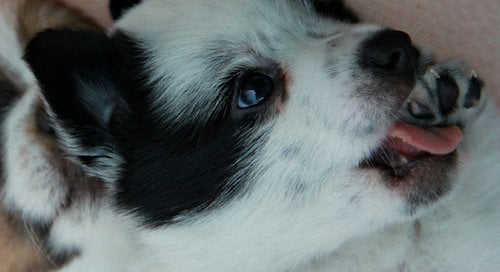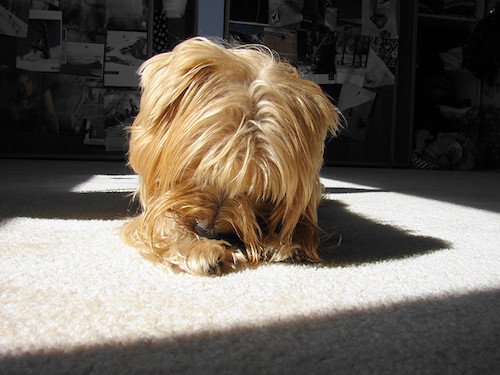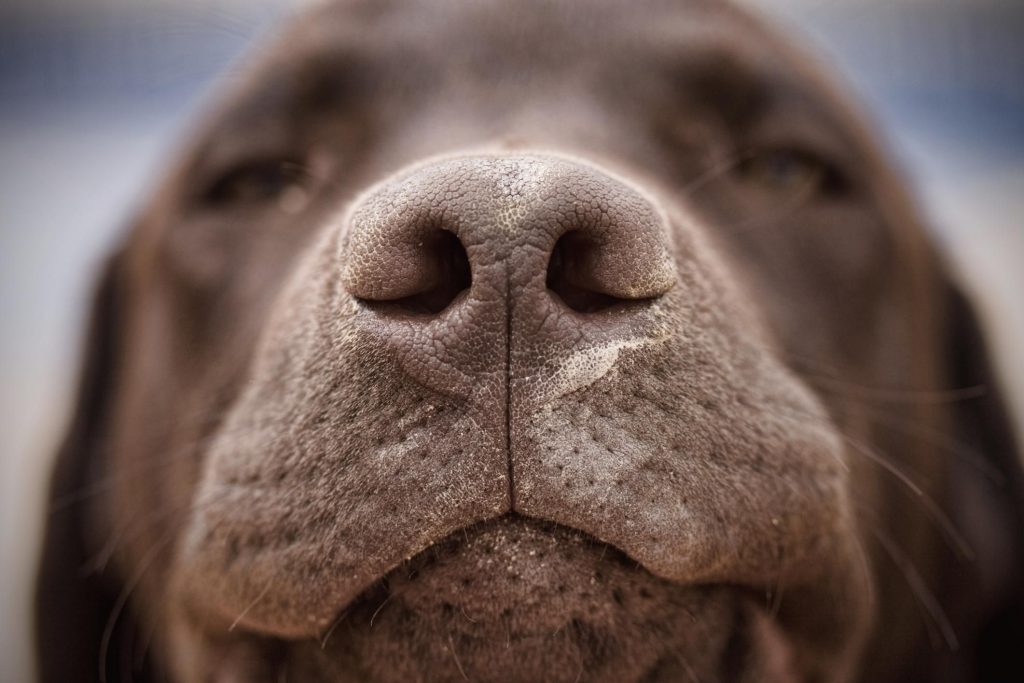- This post contains affiliate links. Read more here.
Is your dog too “into” his paws lately? Is she slurping and chewing away on her own mode of transportation, or licking on her feet and toes unusually? Such behaviour not only seems strange (and unbecoming around guests!), but it can be cause for concern. How much is too much?
If your dog’s chewing or licking of his paws is intense, prolonged, or frequent, you should be concerned. And if your dog is also limping, or the “overly licked” area is red, swollen, bleeding, or smelly, you definitely want to see your vet.
We’ve put together a list of the most common reasons dogs lick and chew their paws too much:
Dry Skin
During winter months or dry summer months, dogs can experience dry skin, just like we do. But instead of moisturising or picking up some lotion at Boots, dogs may lick their paws to relive the itchy feeling of dry skin on their paw pads. The dry skin itself may also be an indication that your dog isn’t getting enough fatty acids in her diet. Fatty acids help keep the skin and coat healthy and flexible.
If you think this might be the case, you can add a dash of olive oil, avocado oil, coconut oil, or fish oil to your dog’s food a few times a week to address the deficiency. Or consider a skin balm formulated specifically for animals.
ResQ Organics Pet Skin Treatment
Loaded with all-natural moisturising coconut, hempseed, and olive oils, this ointment also contains Manuka honey, long touted for its healing properties in humans and dogs alike. Use it to treat itchy paws in spring, chapped ears in winter, and minor abrasions all year long.
Allergies
Dogs can develop seasonal allergies to pollens and moulds, or they may become allergic to cleaning products or chemicals in your home. But food allergies develop frequently among dogs and often result in skin irritation that affects various parts of the body.
Some dogs develop reactions to particular proteins in their food (beef, lamb, dairy, chicken, wheat, eggs, corn, or soy), but it’s difficult to identify the offending ingredient on your own. However, in order for a dog to develop the allergy, she must have had prior exposure to the ingredient in question, meaning it’s likely one of the ingredients in your most tried-and-true dog food is causing the problem.
Talk to your vet about what you’re feeding your dog and explore how you might make nutritional changes that prevent skin irritation.
Injury

Flickr / @Ryolf Per
By licking the paws (sometimes too much), your dog may be nursing an injury, such as a wound or puncture to the toe pads, or possibly a fractured claw or toe. If your dog is particularly active, or has been running off their lead in new terrain, this could be the best explanation.
Always be sure to check the paw (or any area that’s overly groomed) for some initiating cause. Look for visible signs of injury to the area.
Keep an eye out for a splinter, grass seeds or any cuts or tears and cuts to the paw pads.
Parasites
Fleas, ticks, and mites most certainly cause itchy sensations, and your dog may try to address the problem by licking away or chewing out the little buggers. Ticks are easiest to find, but mites are rarely visible, and fleas are difficult to pinpoint unless they’ve run rampant on your dog.
If you can’t identify another cause for your dog’s behaviour, talk to your vet about parasites, particularly if you’re not already providing regular treatment for ticks and fleas.
Psychological Upset

Flickr / @snowboardawL
Dogs—and many animals, humans included—will over-groom themselves when they feel anxious, lonely, depressed, or bored. Licking the paws may temporarily soothe a dog’s nervous system when he feels “too much” or doesn’t receive enough play, stimulation, or affection.
Of course, some dogs are naturally anxious, particularly when mum or dad leave the house. Rescue dogs may have experienced neglect or abuse that turned amplified their anxiety and fear. Observe when your dog engages in the behaviour and what else is going on in the home at that time.
If your dog is alone frequently, a loving dog sitter who offers dog boarding or dog walker can do wonders to help alleviate their stress. Rover.com‘s got plenty of amazing sitters who’d love to step in when you aren’t around. So next time you need a dog lover to take care of your dog, look no further!
The Bottom Line
It would be weird if your dog never licked herself. But if your dog is still licking the same area after several days or a week, definitely give your vet a call.
It’s important to intervene and seek a solution because the behaviour can be self-perpetuating. What starts as an injury may lead to licking, but your dog may discover she likes the feeling. The process of licking may produce a new injury to the paw (tongues are rough and wet!), so the dog will continue to lick to treat the wound when she’s only making it worse.
This behaviour can lead to a rather frightening lick granuloma—an open wound on the paw or leg—or can be accompanied by a yeast or bacterial infection of the skin. So, it’s best to seek help early if you notice the licking and chewing has gone too far.




